BOOK8-Unit-1-Grammar[名词性从句]教学文案
人教课标版高中英语选修8Unit1 Grammar 教学ppt课件(28张)
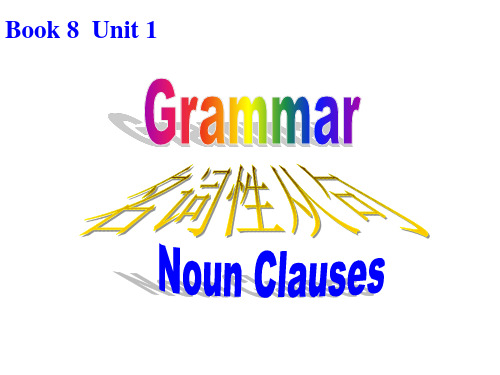
That is why today over 40% of Californians speak Spanish as a first or second language.
表语从句,位于be动词后
Step 3 Linking words
名词性从句的引导词
分类
引导词
作用
Exactly when the first people arrived in what we now know as California, no one really knows.
Step2 Classification
类型 主语从句 宾语从句 表语从句 同位语从句
功用 主语 宾语 表语 同位语
at role do these clauses play in the sentences
However, it is likely that Native Americans were living in California at least fifteen thousand years 从句
Dialogue in the video
whose,
what/which/who J: What are you doing?
She is not what she was four years ago.
主语,宾语 表语,定语
My uncle is the owner of a restaurant
2. However, it is likely that Native Americans were living in California at least fifteen thousand years ago.
人教课标版高中英语选修8 Unit1_Grammar名师教学设计
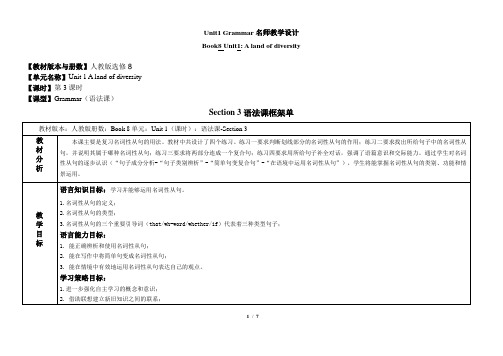
2.T: From the analysis of the sentence patterns, can you tell me what types of noun clauses are there.
S:Noun clauses are classified as subject clause, object clause, predicative clause and appositive clause.
It happened that…碰巧…
It appears that…似乎…
4It is+过去分词+从句
It is reported that…据报道…
It has been proved that…已证实…
It is said that…据说…
it作形式主语和it引导强调句的比较
it作形式主语代替主语从句,主要是为了平衡句子结构,主语从句的连接词有变化。而it引导的强调句则是对句子某一部分进行强调,无论强调的是什么成分,都可用连词that。被强调部分指人是也可用who/whom。例如:
DELC2获取新知识
Step2
Production
(学习
新知)(20mins)
1.Teacher guide Ss to learn the grammar rules of noun clauses.
名词性从句
【概念与分类】在句子中起名词作用的句子叫名词性从句。名词性从句的功能相当于名词词组,它在复合句中能担任主语、宾语、表语、同位语、介词宾语等,因此根据它在句中不同的语法功能,名词从句又可分为主语从句、宾语从句、表语从句和同位语从句。
It hasn’t been decided whether (if) we shall attend the meeting.
选修八unit1语法
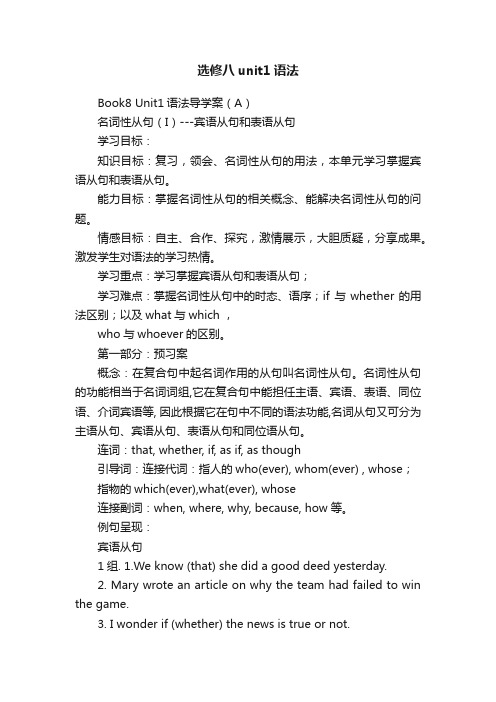
选修八unit1语法Book8 Unit1语法导学案(A)名词性从句(I)---宾语从句和表语从句学习目标:知识目标:复习,领会、名词性从句的用法,本单元学习掌握宾语从句和表语从句。
能力目标:掌握名词性从句的相关概念、能解决名词性从句的问题。
情感目标:自主、合作、探究,激情展示,大胆质疑,分享成果。
激发学生对语法的学习热情。
学习重点:学习掌握宾语从句和表语从句;学习难点:掌握名词性从句中的时态、语序;if 与whether的用法区别;以及what与which ,who与whoever的区别。
第一部分:预习案概念:在复合句中起名词作用的从句叫名词性从句。
名词性从句的功能相当于名词词组,它在复合句中能担任主语、宾语、表语、同位语、介词宾语等, 因此根据它在句中不同的语法功能,名词从句又可分为主语从句、宾语从句、表语从句和同位语从句。
连词:that, whether, if, as if, as though引导词:连接代词:指人的who(ever), whom(ever) , whose;指物的which(ever),what(ever), whose连接副词:when, where, why, because, how等。
例句呈现:宾语从句1组. 1.We know (that) she did a good deed yesterday.2. Mary wrote an article on why the team had failed to win the game.3. I wonder if (whether) the news is true or not.2组. 1. We know (that) she studies English every day.2. We know (that) she studied English last term.3. We know (that) she will study English next year.4. We know (that) she has studied English since 2005.1. She said she enjoyed reading English novels.3组 2. She said the girl was doing some washing .3.She told me that she had never been there before.4. She told me that she would never forgive me.表语从句:4组 1.My suggestion is that we should go shopping.2. It seems that it is going to rain.3.It looks as if it’s going to rain.4.The reason why he was late was that he didn’t catch the early bus.观察以上各组例句,结合语法书,完成以下问题1) 宾语从句的句子结构:____________________________________________________________表语从句的句子结构:____________________________________________________________2)从句中的时态问题在名词性从句中,特别是宾语从句中要注意时态呼应问题,当主句动词是现在时,从句的时态_________________________________;当主句的时态是过去时,从句的时态________________ ____,客观事实除外。
高中英语 Unit1《语法名词性从句》教案8
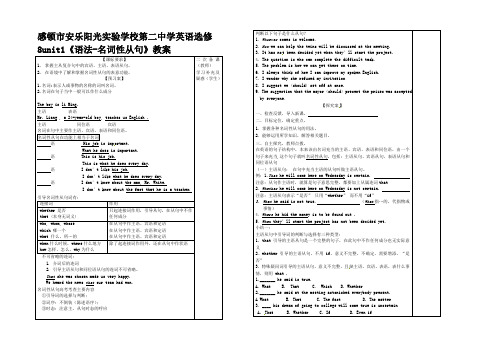
感顿市安乐阳光实验学校第二中学英语选修8unit1《语法-名词性从句》教案【课标要求】1.掌握主从复合句中的宾语、主语、表语从句。
2.在语境中了解和掌握名词性从句的表意功能。
【预习案】1.名词:表示人或事物的名称的词叫名词。
2.名词在句子当中一般可以作什么成分The boy is li Ming.主语表语Mr. Liang , a 24-year-old boy, teaches us English .主语同位语宾语名词在句中主要作主语、宾语、表语和同位语。
名词性从句在功能上相当于名词语 His job is imp ortant.What he does is important.语 This is his job.This is what he does every day.语I don’t like his job.I don’t like what he does every day.语I don’t know about the man, Mr. White.I don’t know about the fact that he is a teacher.引导名词性从句词有:连接词作用whether 是否that (本身无词义) 只起连接词作用,引导从句,在从句中不作任何成分who, whom, whose which 哪一个what 什么,所…的在从句中作主语、宾语和定语在从句中作主语、宾语和定语在从句中作主语、宾语和定语when什么时候,where什么地方how怎样、怎么,why为什么除了起连接词作用外,还在从句中作状语不可省略的连词:1. 介词后的连词2. 引导主语从句和同位语从句的连词不可省略。
That she was chosen made us very happy.We heard the news that our team had won.名词性从句高考考查主要内容①引导词的选择与判断;②词序:不倒装(陈述语序);③时态:注意主,从句时态的呼应二次备课(教师)学习补充及疑惑(学生)判断以下句子是什么从句?1.Whoever comes is welcome.2.How we can help the twins will be discussed at the meeting.3. It has no t been decided yet when they’ll start the project.4. The question is who can complete the difficult task.5. The problem is how we can get there on time.6. I always think of how I can improve my spoken English.7. I wonder why she refused my invitation8. I suggest we (should) set off at once.9. The suggestion that the mayor (should) present the prizes was acceptedby everyone.【探究案】一、检查反馈,导入新课。
8上unit1grammar教案
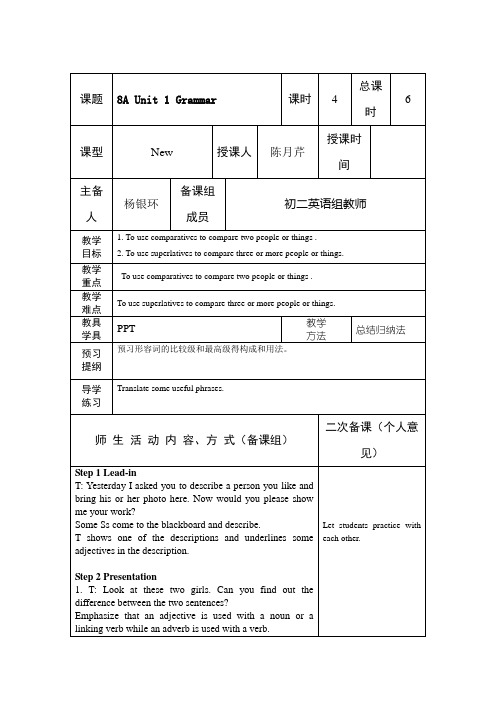
5. Ss do some multiple choice and translation work.
Step4Summarize
T:This class we learnt the use ofadjectives, comparatives and superlatives.Now let’s read an interesting English poemas the end of this lesson.
nice nicer nicest
教后记
Some students grasp them very well. And they should do some exercises about them.
Good, better, best,
Never let it rest,
Till your good is better,
And your better is best!
Step5Homework
Revise the use of adjectives, comparatives and superlatives
导学
练习
Translate some useful phrases.
师生活动内容、方式(备课组)
二次备课(个人意见)
Step 1Lead-in
T: Yesterday I asked you to describe a person you like and bring his or her photo here. Now would you please show me your work?
苏教牛津译林高中英语模块8_Unit1__Grammar参考教案1
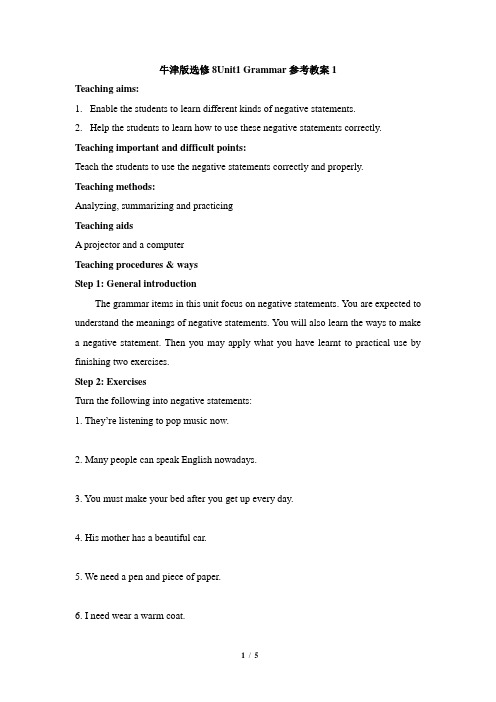
牛津版选修8Unit1 Grammar参考教案1Teaching aims:1.Enable the students to learn different kinds of negative statements.2.Help the students to learn how to use these negative statements correctly. Teaching important and difficult points:Teach the students to use the negative statements correctly and properly.Teaching methods:Analyzing, summarizing and practicingTeaching aidsA projector and a computerTeaching procedures & waysStep 1: General introductionThe grammar items in this unit focus on negative statements. You are expected to understand the meanings of negative statements. You will also learn the ways to make a negative statement. Then you may apply what you have learnt to practical use by finishing two exercises.Step 2: ExercisesTurn the following into negative statements:1. They’re listening to pop music now.________________________________2. Many people can speak English nowadays._________________________________3. You must make your bed after you get up every day._______________________________________________4. His mother has a beautiful car.________________________________________________5. We need a pen and piece of paper.________________________________________________6. I need wear a warm coat._________________________________________________7. The old man always goes for a walk in the park after supper._______________________________________________8. The doctors volunteer in the countryside every year._________________________________________9. Mike does sports in the afternoon.________________________________10. You’d better talk with your parents right now.___________________________________Keys:1. They aren’t listening to pop music now.2. Many people can’t speak English nowadays.3. You don’t have to make your bed after you get up every day.4. His mother doesn’t have a beautiful car.5. We don’t need a pen and piece of paper.6. I needn’t wear a warm coat.7. The old man seldom goes for a walk in the park after supper.8. The doctors don’t volunteer in the countryside every year.9. Mike doesn’t do sports in the afternoon.10. You’d better not talk with your parents right now.Step 3: Explanation and practice:1. Make a list of the most commonly used negative words:no, not, never, neither, hardly, seldom, f ew, little, barely…2. Please decide whether it is a true statement:John Keats was a famous short story writer.This statement is untrue.We can correct an untrue statement in the following way:John Keats was not a famous short story writer.3. As we learned, negative statements are often used to correct a mistaken idea. Let’s recall the ways to make negative statements.4. Read Part 1 and Part 2. When not is used with a negative prefix, the meaning of thesentence is positive. However, the positive meaning is not as strong as that of a direct positive statement. For example:Students are not discouraged to discuss things with their classmates. (Students are encouraged to discuss things with their classmates.)Your actions were not inexcusable, but they were certainly not appropriate. (Your actions were excusable, but certainly not appropriate.)It is not uncommon for him to be late. (It is very common for him to be late.)not can be used before a phrase of time, distance or a noun phrase to emphasize the negative meaning of the phrase. For example:It is not a long distance from the city center to the new railway station. (=It is very near from the city center to the new railway station.)It will not be long before most people around the world know how to use a computer. (=Soon, people around the world will know how to use a computer.) There were not many people present for the lecture. (=There were very few people present for the lecture.)5. Read Part 3. In informal English, the negative expressions can be used with whether and if to show doubt or uncertainty. For example:I wouldn't be surprised if they didn’t buy a house soon.(=I wouldn’t be surprised if they bought a house soon.)I wonder whether/if I shouldn't get a haircut. (=I wonder whether/if I should get a haircut.)I wonder whether/if I shouldn't buy a new suit. (=I wonder whether/if I should buy a new suit.)6. Read Part 4. Pay attention to some negative expressions.on no account, in no circumstances, never before, nowhere, at no time, by no means, 7. Read a book report written by Sharon. Try to cycle the negative statements. Answers:A 1 … he experiences an abnormal childhood without any parents.2 He is raised in a place with other children who also have no parents.3 He is then sent to a workhouse, where he has to work very hard and hardly hastime to relax.4 Oliver does not like anything about the workhouse.5 He is treated very badly and seldom has enough food or water.6 Fagin is not a good character and cares only about himself.7 Oliver does not know anything at first and stays with Fagin.8 He does not want to steal from anyone, but in order to survive, Oliver is forcedto become a criminal.9 Mr. Barnlow is a man without any of Fagin’s vices.10 Unless Oliver can escape, he will never be reunited with Mr. Barnlow.11 He will have only misfortune, not a real family and the love he deserves, which is the major theme of the book.8. Finish Part B individually.AnswersB 1 surprised if, didn’t2 not uncommon3 Not many4 wonder whether/if, shouldn’tStep 4 Language points1.serve(P8)verb [T] : 服务,接待to provide food or drinks: 提供食物,饮料等servicenoun [U] : 服务,接待2.raise (P9)verb [T] : 抚养;抬高, 提高; 举起3. abuse(9))verb [T] : 虐待4. get caught(P9)verb [L + past participle] getting, got, got or US gottensometimes used instead of 'be' to form the passive: 5.pressure(P9)pressverb [I or T;]: 按,压6.threat (P9)noun [C] : 威胁threaten[T] : 威胁Homework1.C1 & C2 in the workbook.2.Unit Revision: Period 5.。
Unit1Grammar教案

2.思维品质:培养学生观察、分析、比较不同时态的语言现象,发展逻辑思维和批判性思维,提高解决问题的能力。
3.文化意识:通过学习时态在真实语境中的应用,使学生了解中西方文化差异,增强跨文化交际意识,培养国际视野。
(三)实践活动(用时10分钟)
1.分组讨论:学生们将分成若干小组,每组讨论一个与英语时态相关的实际问题。
2.实验操作:为了加深理解,我们将进行一个简单的时态填空练习。这个练习将演示不同时态的基本原理。
3.成果展示:每个小组将向全班展示他们的讨论成果和填空练习的结果。
(四)学生小组讨论(用时10分钟)
Unit 1 Grammar教案
一、教学内容
《Unit 1 Grammar教案》
本节课教学内容选自八年级英语上册,主要包括以下章节内容:
1.一般现在时态
2.一般过去时态
3.一般将来时态
4.现在进行时态
5.过去进行时态
二、核心素养目标
《Unit 1 Grammar》的教学旨在提升学生的英语学科核心素养,具体目标如下:
-难点2:动词过去式的变化。如:“eat”的过去式是“ate”,“go”的过去式是“went”。
-难点3:在实际情境中运用时态。如:描述正在进行的动作时,学生可能会说成“I am going to the library”而非“I am going to the library now”。
在教学过程中,教师需针对以上难点进行重点讲解和练习,帮助学生理解并掌握各时态的核心知识,提高他们在实际语境中正确运用时态的能力。
在小组讨论环节,学生们提出了许多关于时态在实际生活中应用的问题,这让我意识到他们已经开始学会将所学知识运用到实际情境中。然而,如何在短时间内帮助学生们更好地消化吸收这些知识点,仍然是我需要思考的问题。
8Bunit1Grammar2电子教案
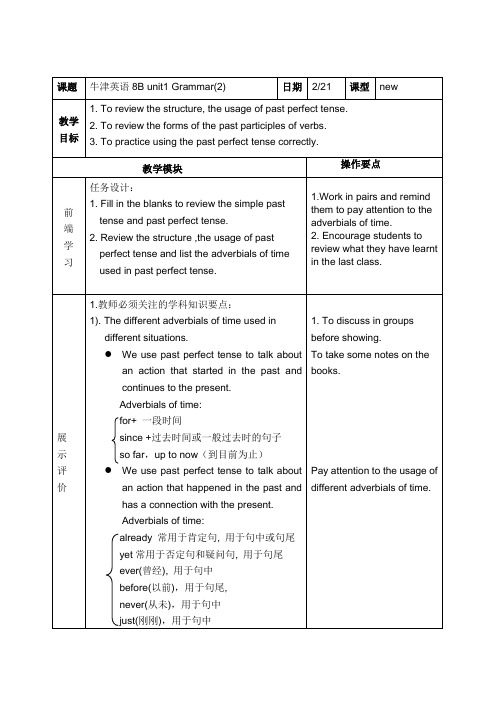
日期 2/21 课型 new
教学 目标
1. To review the structure, the usage of past perfect tense. 2. To review the forms of the past participles of verbs. 3. To practice using the past perfect tense correctly.
A. Already
B. since
C. for
D. yet
3). He has ____ seen the film Harry Potter.
So he knows nothing about it.
A. already
B. ever
C. never
D. yet
4).She has been ill in bed ___ two days ago.
ever(曾经), 用于句中 before(以前),用于句尾, never(从未),用于句中
just(刚刚),用于句中
知识结构图(教师):
Past perfect
tense
what it is(three situations) the structure the past participles of verbs the adverbials of time
4. 事实上,我已经读过那本杂志了。
In fact, I _____________________________.
5. 你在这住了多久了?
How long _________________________? 6. 我很长时间没有拜访我叔叔了。
Book8 Unit1 Grammar

4. think, believe, imagine, suppose 等动词,主语为第一人称时引起的否 定性宾语从句中,将从句中的否定形 式移到主句中,即要把上述主句中的 动词变为否定式,例如: We don’t think you are here. 我们认为你不在这。 I don’t believe he will do so. 我相信他不会这样做。
四. it 作形式主语和it引导强调句的比较
it 作形式主语代替主语从句,主要是为了
平衡句子结构, 主语从句的连接词有变化。
it引导的强调句则是对句子某一部分进行
强调,无论强调的是什么成分,都可用连词that。
被强调部分指人是也可用who/whom。例如:
It is a pity that you didn’t go to see
表语从句
一、含义:在复合句中用作表语的从句是 表语从句。 二、其基本结构为:主语 + 系动词 +表语从 句。 That’s what we should do. That’s why I want to see you. The reason for my absence was that I was ill.
= It is true that the earth is round.
2. Whether he will come hasn’t been decided. = It hasn’t been decided whether he will come.
二. 用it 作形式主语的结构 (1) It is+名词+从句 It is a fact that … 事实是… It is an honor that …非常荣幸 It is common knowledge that…是常识 (2) It is+形容词+从句 (多用 should) It is natural that… 很自然… It is strange that… 奇怪的是…
八年级英语8BUnit1Grammar(1)教案

8B unitl Grammar(1)一、 教学目标1、 识记动词的过去分 词形式。
2、 能够在语境中正确运用现在完成时。
二、 预习导学A ) 预习 GrammarA ,并完成 part A1 and A2B ) 记忆下列动词的过去分词。
1 、eat2 、see3 5 、write 6 、put7 9 、move ・ 10 、visit1113、know14、do15 三>课堂导学A )语法1、现在完成时的定义:现在完成时通常是指过去某一动作对现在的影响或过去发生的某 一动作持续到现在(可能要持续下去)2现在完成时的句式构成:主语+have/has+动词的过去分词+ (宾语)+ (地点)+ (时间) 各种句式如下:肯定句:1 have lived in ShuYa ng for two years. 否定句:1 have not lived in ShuYa ng f or two years. 一般疑问句: Have you lived in ShuYa ng for two years? 肯定回答: Yes, I have. 否定回答:No, 1 haven ' t特殊疑问句: How long have you lived in ShuYang?3、现在完成时的基本用法: a.现在完成时可表示过去发生的动作对现在所产生的影响,后面通常不用时间状语, 但句中常出现 already ,just , yet 等副词。
Some one has broke n the win dow. I have just fini shed readi ng the book. He has already seen the doctor. Have you see n the doctor yet?( 注意:already 常用于肯定句中,置于句中。
yet 常用于否定句和疑问句中,常用于句末。
)b )现在完成时也可表示从过去某时开始的动作或状态一直持续到现在,引导的时间状语连用。
人教版选修八Unit1 Grammer名词性从句讲义设计
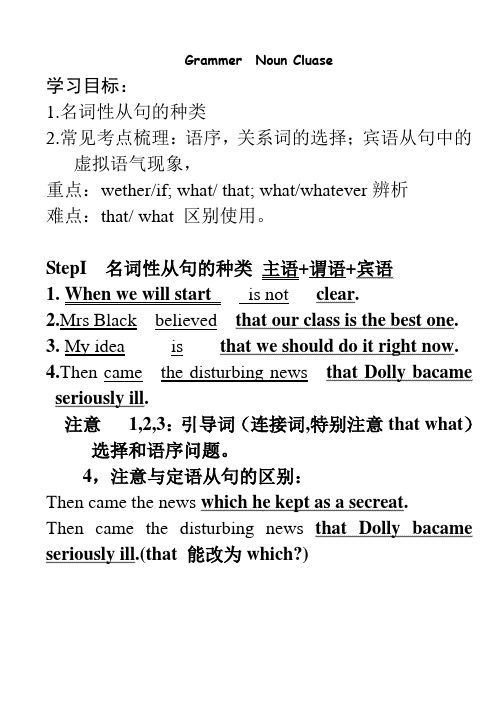
Grammer Noun Cluase学习目标:1.名词性从句的种类2.常见考点梳理:语序,关系词的选择;宾语从句中的虚拟语气现象,重点:wether/if; what/ that; what/whatever辨析难点:that/ what 区别使用。
StepI 名词性从句的种类主语+谓语+宾语1. When we will start is not clear.2.Mrs Black believed that our class is the best one.3. My idea is that we should do it right now.4.Then came the disturbing news that Dolly bacame seriously ill.注意1,2,3:引导词(连接词,特别注意that what)选择和语序问题。
4,注意与定语从句的区别:Then came the news which he kept as a secreat.Then came the disturbing news that Dolly bacame seriously ill.(that 能改为which?)练习与总结:主语从句1.她干了什么尚不清楚。
she did is not known.2.这事怎样发生的,谁也不清楚。
_______ this happened is not clear to anyone.3.不论谁来都欢迎。
________ comes is welcome.4.毫无疑问她考试成绩会很好。
_____ is certain that she will do well in her exam.6.他是否来这里还不清楚。
____he’ll come here is not clear.7.任何一个来的人将受到欢迎______ comes will be welcomed.9.有人建议会议如期召开.___is suggested that the meeting should ___.(put off 推迟,延期)10. 把下面句子改为it做形式主语,或相反That you are so indifferent bothers me.你如此冷淡使我很烦恼。
人教版选修八Unit 1语法学案-word

Book8 unit1 Grammar名词性从句名词性从句的功能: 功能相当于名词词组, 它在复合句中能担任主语、宾语、表语、同位语、介词宾语等。
名词性从句:表语从句、宾语从句、主语从句、同位语从句一、主语从句小组讨论,找出下列句子的主语并总结。
1.A mooncake is a delicious, round cake.2.I don’t know if it will grow.3.To give is better than to receive4.That light travels in straight lines is known to all.总结:主语可由____词、____词、数词、不定式、动名词和______等来承担。
一般位于谓动词________。
一、小组讨论并判断下列句子那些是主语从句。
Yes or No?1.That he finished writing the composition in such a short time surprised us all.2.I think that you must work harder.3.The fact is that we have lost the game.4.When they will come is unknown.5.Who will be our monitor hasn't been decided yet.6.Whatever you did is right.7.What we need is time.8.It is certain that he will win the match.二.课堂练习:(1)________he said was not true.(2)________he likes most is reading.(3)_______he is brave is true.(4)_______ will take part in the meeting has not been decided.(5)________she is from is unknown.(6)________she keeps healthy is a secret.(7)________can join in the sport meet is decided by the teacher.(8)________book I shall choose hasn’t been decided.三、主语从句特殊用法:1. It is very likely that they will hold a meeting.It + be + 名词/形容词+主语从句2. It seems that he has seen the film. 似乎It+不及物动词(seem, happen, matter)+主语从句3. It is said that President Obama will visit our school next week. 据说…It+过去分词+从句总结:it 做形式主语,为了防止句子头重脚轻,通常把形式主语it放在主语位置,真正主语搁置于句末。
选修8 unit 1 Grammer

Tell the difference
1.The news that the plane would take off on time made everybody happy. 同位语从句 2.The news that is spreading around the airport is that a heavy storm is coming. 定语从句
3、主语从句的主谓一致
主语是名词性从句时,动词通常用单数形式。 1.Whatever he says is of no importance. 无论他说什么都不重要。
2.That he will come is certain.他肯定会来。 但在下面的句子中谓语动词要用复数形式, 因为主语从句中的动词是复数,所以主语从句 应当作复数看待。例如: 6.Whoever say that are to be punished. 谁这样讲,就惩罚谁。 7.Who are going to attend the meeting have been decided by the manager. 哪些人去参加会议,已由经理做出了决定。
Unit 1 Grammar
名词性从句的概念:
在句子中起名词作用的句子叫名词从句Noun Clauses。 名词从句的功能相当于名词词组, 它在复合句中能担 任主语、宾语、表语、同位语、介词宾语等,因此根 据它在句中不同的语法功能,名词从句又可分别称为 主语从句、宾语从句、表语从句和同位语从句。
引导名词性从句的连接词可分为三类:
同位语从句与定语从句 的区别 种类 宾语从句的语序问题 理清易错点 巩固 练习
一、名词性从句的类型
1、主语从句
在复合句中作主句的主语. 引导词有连词that (不可省), whether; 代词有who, what ,which; 副词 when ,where, how, why 等.
BOOK8 U1 Grammar 公开课
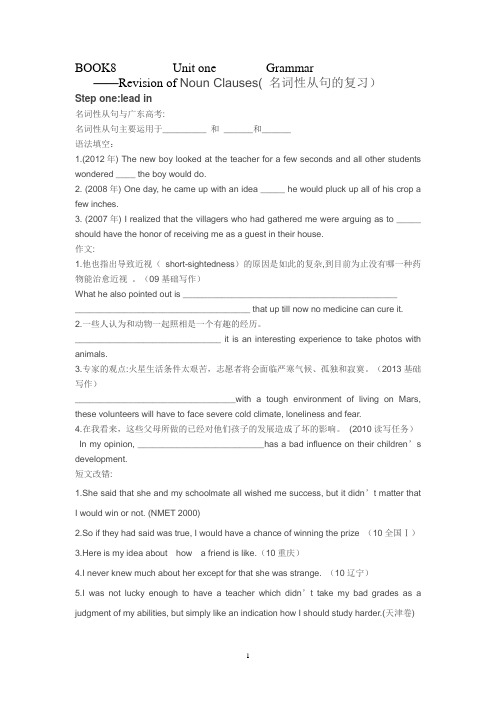
BOOK8 Unit one Grammar——Revision of Noun Clauses( 名词性从句的复习)Step one:lead in名词性从句与广东高考:名词性从句主要运用于_________ 和______和______语法填空:1.(2012年) The new boy looked at the teacher for a few seconds and all other students wondered ____ the boy would do.2. (2008年) One day, he came up with an idea _____ he would pluck up all of his crop a few inches.3. (2007年) I realized that the villagers who had gathered me were arguing as to _____ should have the honor of receiving me as a guest in their house.作文:1.他也指出导致近视(short-sightedness)的原因是如此的复杂,到目前为止没有哪一种药物能治愈近视。
(09基础写作)What he also pointed out is ________________________________________________________________________________ that up till now no medicine can cure it.2.一些人认为和动物一起照相是一个有趣的经历。
______________________________ it is an interesting experience to take photos with animals.3.专家的观点:火星生活条件太艰苦,志愿者将会面临严寒气候、孤独和寂寞。
人教新课标高二英语book8unit1 语法名词性从句课件(共15张)
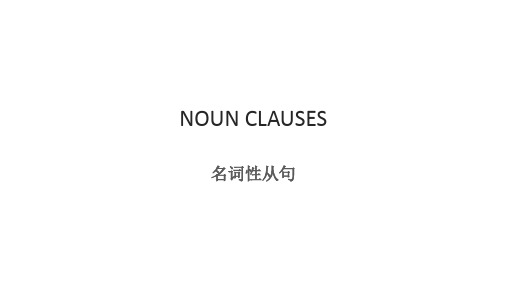
• I don’t like what he does every day.宾语
• 4.I don’t know about the man, Mr. White.同位语
• I don’t know about the fact that he is a teacher.同位语
二.名词性从句的关联词有三类: 1. 从属连词:that, whether, if 2. 连接代词:who, whom, whose, what, which, whoever, whomever, whatever, whichever 3. 连接副词:when, where, why, how, whenever, wherever, however
基本句型结构 It is + 名词 + that从句 It is + 形容词 + that从句
It is + 过去分词 + that从 句
It + 不及物动词 + that从 句
常用词语 It is a fact/a shame/a pity/no wonder/good news/…that… It is necessary/strange/important/possible/likely/…that…
• 2.The photographs will show you ______________________ .
•
A. what does our village look like B. what our village looks like
•
C. how does our village look like
D. how our village looks like
- 1、下载文档前请自行甄别文档内容的完整性,平台不提供额外的编辑、内容补充、找答案等附加服务。
- 2、"仅部分预览"的文档,不可在线预览部分如存在完整性等问题,可反馈申请退款(可完整预览的文档不适用该条件!)。
- 3、如文档侵犯您的权益,请联系客服反馈,我们会尽快为您处理(人工客服工作时间:9:00-18:30)。
Whatever和 whoever引导主语从句或宾语 从句,通常在从句中作主语或宾语,
whatever=anything that,
whoever=anyone who.
• As far as I’m concerned, whatever he
says is right.
主语从
• I believe whatever he say句s . 宾语从句
主语从句
一个句子在复合句中充当主语叫主语从句。
e.g. That the earth is round is true . Whether she will come or not is still a question . What you are doing seems very difficult . When they will start has not been decided yet .
2.表示“是否”意义时,一般用whether 而不用 if引导主语从句,
Whether she will come or not is still a question .
3.可用形式主语it 代替主语从句:
eg. It is still a question whether she will come or not .
everybody present.
A. What
B. That
C. The fact
D. The matter
what与that在引导主语从句时的区别:
what引导主语从句时在从句中充当句子成分,如 主语,宾语,表语.而that则不然,它在句子中只起连 接作用,没有意义,但也不能省略。
(1) What you said yesterday is right. (2) That the earth goes around the sun is well- known to everybody.
表语从句
The news that we won the game is
exciting.
同位语从句
Subject Clause (主语从句) Object Clause (宾语从句) Noun clause Predicative Clause (表语从句) Appositive Clause (同为语从句)
It occurred to me that… 我突然想起……
It doesn’t matter whether/how…
练一练!
1. ____ you don’t like him is none of my
business.
A. What
B. Who
C. That
D. Whether
2. ____ he said at the meeting astonished
1. 引导主语从句的连词that是不能省略的。
That the earth is round is true. That you have to leave is a pity.
That-从句作主语通常用it作先行词,而将that-从 句置于句末,例如: It is true that the earth is round. It’s a pity that you have to leave. 你非走不可真是件憾事。
It has not been decided yet when they will start .
用it作形式主语的that-从句有以下四种不同的搭配关系:
a. It + be +形容词+ that-从句
It is necessary that…
有必要……
It is important that…
BOOK8-Unit-1-Grammar[名 词性从句]
Who will win the match is still unknown. 主语从句
I want to know what he has told you.
宾语从句
The fact is that we have lost the game.
It is a surprise that…令人惊讶的 是…… It is a fact that… 事实是……
It is a pity that… 遗憾的是······
d. It +不及物动词+ that-分句
It appears/seems that… 似乎……
It s that…
碰巧……
重要的是……
It is obvious that…
很明显……
b. It + be + -ed 分词+ that-从句
It is said that…
据说······
It is reported that…
据报道······
It is believed that…
人们相信……
It is known to all that…
off the lights.
A. Anyone
B. The person
C. Whoever D. Who
4. _____the sports meet will be held
depends on the weather.
A. Whenever B. If C. Whether D. That
5. ___ is a fact that English is being
• Whoever wants to enter his office must knock at the door first. 主语从句
• Please give the tickets to whoever wants to go to the movie. 宾语从句
3. ____ leaves the room last ought to turn
众所周知……
It has been decided that… 已决定……
It is suggested/recommended that …据建议·······
It is required/ demanded that… 据要求·······
c. It + be +名词+ that-从句 It is a wonder that…令人惊奇的是……
